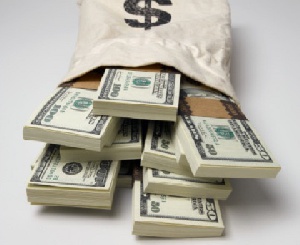Ghana has recorded total investments of US$869.47 million, with total FDI value amounting to US$785.62 million between January to June 2020 as FDI inflow showed rare strength in the final moments of the second quarter of the year, undeterred by the COVID-19 pandemic.
Worldwide, the United Nations Conference on Trade and Development (UNCTAD) has estimated that the Covid-19 pandemic to send global FDI plunging by about 40 percent – driving the total value of FDI below US$1 trillion for the first time since 2005.
However, in spite of a sluggish start in the first quarter of 2020 and a worrying slump in the beginning of the second quarter due to severe lockdown measures to contain the spread of the coronavirus, FDI to Ghana have begun to rebound resulting in a notable increase in FDI inflow for the first half of the year.
At the GIPC, a total of 69 projects with a total estimated value of US$688.74 million was recorded by the end of June 2020. Of this, the total FDI component amounted to US$627.52 million while local components accounted for an estimated US$61.22 million. The FDI value of US$627.52 million was a considerable increase of about 409.10 percent from last year’s FDI value of US$123.26 million recorded within the same period (Jan-Jun 2019), depicting a strong performance irrespective of the global pandemic.
Out of the 69 projects recorded, the services sector registered a majority of 25 projects followed by the manufacturing and export trade sector with 21 and 11 projects respectively.
With regards to value, general trading recorded the highest amount of US$246.05 million. This was tailed closely by the mining exploration sector with US$231.02 million having sealed some major investments such as the Chirano Gold mine project for the exploration of minerals. The manufacturing sector also saw significant investments valued at US$170.67 million on the back of some notable ventures such as a deal by Matrix industries for the manufacture of paper and aluminum products as well as the Rainbow Paints Limited project which is a joint venture between Ghana and Kenya for the manufacturing of paints and related products.
Geographically, the spread of the project cuts across 6 regions namely, Greater Accra, Central, Eastern, Ashanti and Volta regions with most projects registered in the Greater Accra enclave.
Together, the 69 projects are expected to make a significant contribution to job creation in the country. Per estimations, a total of 14,614 jobs are expected to be created when the projects are fully operational. Out of this, 14,052 of the jobs representing 96.15 % will be for Ghanaians whilst the remainder of 562 jobs which represents 3.85% will be taken up by foreigners.
Meanwhile, additional equity totaling US$11.56 million was re-invested by existing companies within the first half of the year, while a total of GHC1,365.26 million was recorded as investments from 28 wholly-owned Ghanaian businesses.
The seemingly positive performance of FDI inflows to the country has been to an extent attributed to the gradual easing of the Covid-19 restrictions as well as government initiatives and incentives rolled out to buffer businesses and the economy at the height of the pandemic.
Regardless of the upbeat performance, the United Nations Conference on Trade and Development (UNCTAD) predicts that FDI will continue to see a decline of 5-10 percent in 2021 with a slow recovery to be initiated in 2022 driven by restructuring of global Value Chains and a general rebound of the global economy.
In this regard, the GIPC remains cautiously optimistic about the flow of FDI to Ghana, as we move forward.
That notwithstanding, the Center will continue to assiduously pursue worthwhile investments for economic development as well as support government initiatives such as the COVID-19 Alleviation and Revitalisation of Enterprises Support (CARES) Programme to help bolster the Ghanaian economy towards a recovery and remain resilient pre and post pandemic.
Business News of Saturday, 24 October 2020
Source: 3news.com













